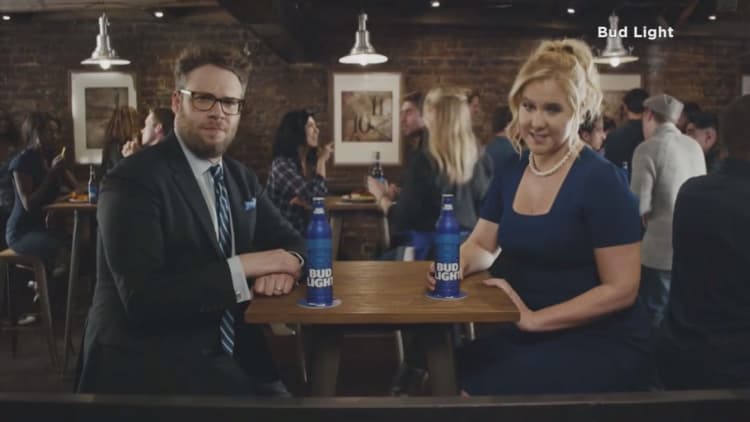
Bud Light's newest advertisement could have been a major misstep for the beer company.
In its latest national television advertisement featuring Amy Schumer and Seth Rogan as representatives of the "Bud Light Party," Anheuser-Busch claims to be a supporter of equal pay.
"Bud Light proudly supports equal pay," Schumer says in the TV spot. "That's why Bud Light costs the same, no matter if you're a dude or a lady."
While Schumer and Rogen received equal compensation for their roles in the advertisement campaign, the company reportedly declined to provide information about how many women are employed within the company, how much they are paid and how much their pay compares to their male coworkers, The Washington Post reported on Wednesday.
The company told CNBC on Thursday that it did provide information to the Washington Post and has requested a clarification.
"Our position on equal pay has been very consistent over the years," Alex Lambrecht, vice president of Bud Light, said in a statement to The Washington Post. "We believe diverse perspectives are good for our business, and in equal pay for equal work."
Lambrecht also noted that Anheuser-Busch uses "a rigorous and gender-blind compensation process" to determine wages.
A spokesman for the company told CNBC that Anheuser-Busch has taken action to support diversity in its workforce. As of June 2015, 51 percent of the company's U.S. marketing team was comprised of women; 60 percent of its incoming MBAs last year were women; and 5 of its 12 U.S. breweries are currently helmed by female brew masters.
As of 2014, the company reportedly employed one woman on its 11-person North American leadership team, one woman on its 17-person executive team and two women on its 14-person board, according to the paper.
In addition, Anheuser-Busch was slapped with a lawsuit in 2009 after one female executive discovered that her salary of $360,000 was about 57 percent of what her male predecessor had earned for the same job.
The jury found her claims to be without merit, according to Anheuser-Busch. A spokesman told CNBC on Thursday that the employee had been compensated fairly during her 20 years with the company.
Read the full report from the Washington Post.
(UPDATE: This story has been updated to include comment from Anheuser-Busch.)


